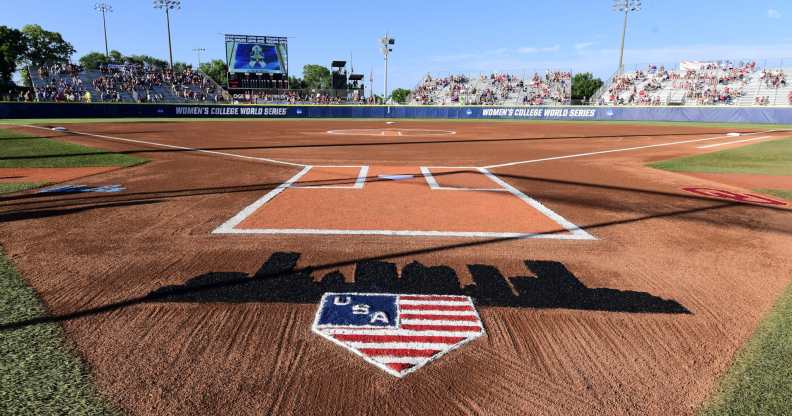‘Hypocritical’ NCAA announces games in states where trans athletes can’t compete

Last year’s Division I Women’s Softball Championship on June 4, 2019 in Oklahoma City. (Tim Nwachukwu/NCAA Photos via Getty Images)
The National Collegiate Athletic Association (NCAA) has been accused of hypocrisy for scheduling softball championship games in US states that ban trans athletes from competing.
Last week, the NCAA announced 20 preliminary round sites at universities and colleges for this year’s Division I Softball Championship – a college competition that will be broadcast on ESPN and that culminates with the Women’s College World Series.
LGBT+ activists are dismayed as three states that the NCAA have announced as preliminary round sites – Alabama, Arkansas and Tennessee – recently passed bills that mean trans women are banned from competing.
The bans are part of a wave of Republican-backed anti-trans bills in the US, which are resulting in an increasing number of states banning trans athletes – specifically trans women and girls – from competing on the school or college› sports team of their gender.
West Virginia, Arkansas, Tennessee, Mississippi, South Dakota and Alabama have all banned trans girls and women from female sports teams in 2021, with more anti-trans sports bills being considered in multiple US states.
One trans advocate, who asked to remain anonymous, told the Los Angeles Blade that the NCAA’s choice for the games was hypocritical and contravened its earlier statement in support of trans athletes.
In April, the NCAA Board of Governors responded to the wave of anti-trans bills in a strong defence of trans athletes, saying the NCAA “firmly and unequivocally supports the opportunity for transgender student-athletes to compete in college sports”.
“Inclusion and fairness can coexist for all student-athletes, including transgender athletes, at all levels of sport,” the NCAA said in its April statement.
It continued: “When determining where championships are held, NCAA policy directs that only locations where hosts can commit to providing an environment that is safe, healthy and free of discrimination should be selected.
“We will continue to closely monitor these situations to determine whether NCAA championships can be conducted in ways that are welcoming and respectful of all participants.”

